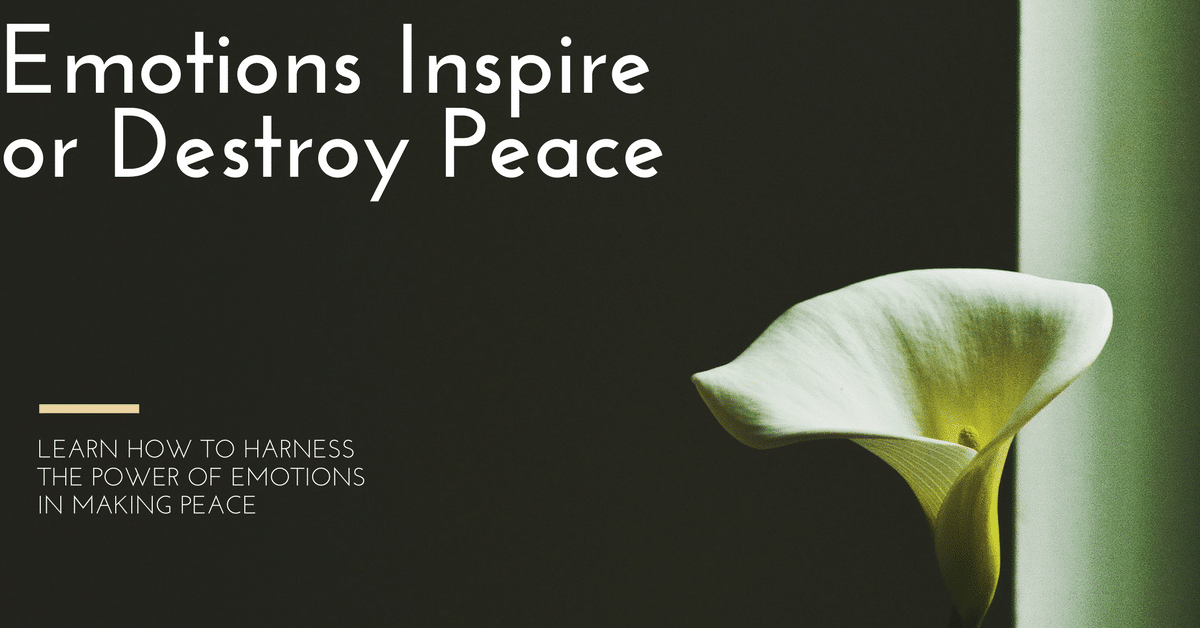What Are Emotions Anyways?
What are emotions?
We are emotional beings. But let me ask you a simple question.
What Are Emotions?
Stop reading and see if you can answer the question. Don’t take more than a couple of seconds to think about it.
If you are like most of my readers and students, the question is a little confusing. You think you know the answer, but when you are asked to define emotions, your mind goes blank. If that happened to you, welcome to the group. Almost everyone is stumped by this one. After all, we experience emotions all the time; shouldn’t we know what they are?
The problem is not your fault. You simply were never taught the definition of emotions. We’ll fix that problem in the rest of this post.
So here is the most intelligent definition of emotions I have found:
Emotions are defined as biologically based patterns based on experience, education, and culture.
They are cognitive constructs that we create in our brains, starting at about 18 months of age.A cognitive construct is a pattern of experience or perceptions that we store in our memories for future use. Emotions are patterns that are based on our biology, physiology, experience, language, memory, and culture.
All information we receive is processed first through emotions. Emotions motivate us, restrain us, defend us, and protect us. Unfortunately, for 4,000 years, western philosophers and theologians have told us that emotions are bad, weak, they make us vulnerable and exploitable and they are even evil.
Most people take emotions for granted and give them little thought other than when emotions become intrusive.
However, we are 98% emotional and only 2% rational. So it makes sense that we should understand what emotions are so that we can honor and master them. Not learning about and mastering emotions means that you are leaving 98% of who you are on the table. You are not fully present with 100% of yourself. This leads to pain, suffering, and unnecessary relationship difficulties.
We Are Not Born With Emotions
We are not born with emotions, we have to create emotions. Creating emotions is part of the process of growing up, and if it is blocked, you don’t mature emotionally. Think about how many people you have met who are physically adult, but emotionally childish. Their emotional development stopped when they were young and they became emotionally stuck at that age.
Our emotional development starts at about the time we verbalize.
We Have To Learn What Are Emotions
Emotions are the cognitive constructs that allow us to take affective experience and concretize it into something that we can be conscious of.
So you are wondering, “What is affective experience?” Yeah, it’s neuroscience geek-speak. Let me translate. We are born with affect, which are feelings of pleasantness and unpleasantness that we experience. As babies, we smile and coo when we feel good we cry when we feel bad. Those feelings of contentment and distress are called basic affect. They are not emotions.
To create emotions, we take our basic affect and, like an artist’s palette or a chef’s recipe, mix it different combinations to come up with different colors or flavors of emotions. This is a life-long learning process.
We’re not self-aware of affect, but we can become self-aware of emotions. Knowing what are emotions gives you a tremendous advantage over people who don’t know what emotions are.
Emotions Provide Understanding About What’s Going On Around Us
Knowing what are emotions and what are not allows us to look around and look for cause and effect. What has caused me to get so angry? If I didn’t know what emotions are, I wouldn’t be able to determine what was making me angry.
Knowing what emotions are allow me to communicate to other people that I’m angry, and that’s very powerful. If all I had was affect, then I have to rely on automatic programming. I can’t communicate anything about what I’m experiencing. This is why people experience, “I’m so mad, I could put my fist through a wall.” They haven’t been able to transform the core affect of anger into an emotion they can process because they don’t know what emotions are. 12 Powerful Benefits of Emotional Awareness

Not know what emotions are is really a lack of emotional self-awareness, and it’s a reaction to a strong, affective state. You are feeling so strongly you can’t manage, understand, or process any of it. The only way you relieve yourself of the discomfort is through violent physical action, denial, suppression, or addiction (work addiction, exercise addiction, food addiction, drug addiction, alcohol addiction, etc.). I meet so many people that suffer from their inability to know what are emotions, to not manage their strong emotions, and to run from the strong emotions of others. Lack of emotional awareness seems to normal. You don’t have to be that way, however. How to Honor Your Emotions With This 1 Powerful Tool

The good news is that you can learn what are emotions and become emotionally self-aware, no matter how badly you think you are with emotions. Our brains are hard-wired to be emotional and to respond to emotions. All you have to do is learn some simple, counter-intuitive skills, and your life will be transformed. To learn more, check my Developing Emotional Competency Course here.
Source : Youtube
Learn How to Calm Anyone Down…
IN FOUR HOURS!
Doug’s best-selling book, De-Escalate: How To Calm An Angry Person In 90 Seconds or Less, will guide you through the three simple steps that will de-escalate any intense fight or argument in literally seconds. Within four hours, you can be making peace instead of fighting and arguing.


To a degree, yes. For people who are not as emotionally self-aware, affect labeling helps them restart their prefrontal cortex. I have found that it is also powerful with people who are very self-aware (like my wife, lol). She knows exactly what I am doing and deeply appreciates it. Thanks for the comment.
The lack of self-awareness must be why affect labeling works to help others label their emotions.
… * organ .. should read or refer to the ‘heart’ … not the brain
… I found this most enlightening, as I have always assumed we are ‘born with emotions’ … although, I do wonder on the other ‘organ’ other than our brain is at work in the construct ~ context of emotions, even in fetal development; … I’ve also wondered about the emotional development of an ‘mother absent’ infant, … that misses out on the true bond of birth mother & as I promote breast feeding; mother’s breast & her health, life giving milk I hold as sacred the gift of being able to convey to your child this kind of empathic love… who can argue the emotional response of the sucking ‘reflex’ in the infant … yes, early signs of emotions I think are evident or visibly discerable, at birth onwards; not in the cognitive sense, until 18 months, but in the sea of osmosis of emotive bonding, … which I think is the realm of the heart … aided by, as many functioning senses that are available … touch, aroma, sight, hearing … this glorious ocean of intimacy & engagement with our ‘beginning world’ is essential for building on a strong structure of awareness of self; through emotional development … a strongly empathic person becomes an open window from day 1; those born natural empaths …. others must learn the skill of empathy … but, then of course, born empaths need to their recognize & refine their empath abilities too, to avoid door-mat & victim syndromes, or the ‘taking on of many crosses of others” empathic exhaustion …
… due to a recent profound online romance, I have discovered the order of magnitude of passionate soul bonded deeply empathic romantic love … this is not the warm hearts n’ smiles club of tender respected friendships, or of ‘choice’ of soul mate; or of the torrid desire ego obsessed physical attractions; all libido, or no-go,… or the painful opposite of an unrequited love… ours was a fully juxtaposed soul within soul experience of the most exquisite happiness & joy … fully blossomed as totally fulfilling in every way … an eternal quality, forever new, a delight unending … this profound experience was filled with powerful empathy, natural spontaneous to every nuance of thought & emotion … & I, as a single, never married, woman (heterosexual); I never could have imagined such a love would happen to me … but, there was a severance at about the 3 month timeline, in which due to extreme distance & inability to meet in person to consummate our passion …our relationship deteriorated … so, as this encounter with all of it’s galaxy of beauty, has also had it’s shadow side, as I learn more of men, their depletion of testostrone as they age; especially vulnerable are men who are/were first responders, law enforcement, & the military … the man who has spent many years without affection of love, or physical contact of any depth of meaning; (my lover friend was 8 yrs. a widower); … so, the alchemical bond with us was instantaneously cosmic magnetism; as we were ‘shoved’ together by glorious love … we each blossomed out towards each other … so, as I recover from what I hope is a temporary severance; I’m learning much about this kind of empathy; in the context of (book: auth: Thomas More; … Soul Mates: Honoring the Mysteries of Love & Relationship: this book is extra-ordinary especially the chapters: chapt. 6 … The Intimate Imagination … as well as chapt. 8 … Sex & the Imagination … as a creative conceptionalist, I’ve always had a wide open empathic beautiful imagination, that paints large landscapes … so, my interest is in the two becoming one, that is the say, the ‘marriage’ or union of empathic imagination & the sea of emotions, like a paint box, that fills the landscape with the narrative … emotions are the ‘bell-weather’ of the soul, come storms, or sunny skies …